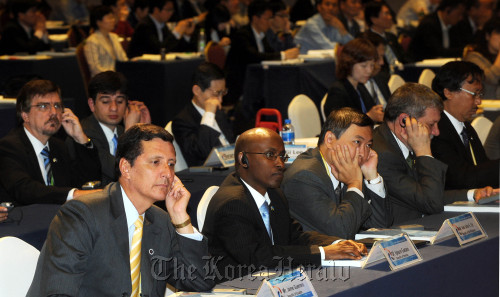Global ministerial meeting focuses on digital convergence, social networking services
Ministers and vice ministers from 21 countries gathered in Seoul on Wednesday to share views about how innovative solutions and next-generation technologies could reshape people’s lives and offer new opportunities.
“A smart society has come, which puts an emphasis on digitalization, mobility and two-way services with the development of information and communications technologies and media convergence,” said Choi See-joong, chairman of the Korea Communications Commission.
“Wireless devices like smartphones, smart televisions and 3-D TVs are leading a convenient and productive lifestyle and the introduction of the smart work system allows people to work outside of the office. Not only that, social networking services like Twitter and Facebook are not only used to create a human network but also contribute in creating a voice for the people, which was a traditional role of the media.”
Ministers and vice ministers from 21 countries gathered in Seoul on Wednesday to share views about how innovative solutions and next-generation technologies could reshape people’s lives and offer new opportunities.
“A smart society has come, which puts an emphasis on digitalization, mobility and two-way services with the development of information and communications technologies and media convergence,” said Choi See-joong, chairman of the Korea Communications Commission.
“Wireless devices like smartphones, smart televisions and 3-D TVs are leading a convenient and productive lifestyle and the introduction of the smart work system allows people to work outside of the office. Not only that, social networking services like Twitter and Facebook are not only used to create a human network but also contribute in creating a voice for the people, which was a traditional role of the media.”

Claiming that the “mobile miracle” allows people to live in several centuries simultaneously, the transformation in telecommunication, especially mobile telecommunications, has reshaped the country’s way of life in many aspects ― such as mobile banking, e-health and e-public information, said M. Rafiqul Islam, additional secretary of the Ministry of Posts and Telecommunications of Bangladesh.
Paulo Bernardo Silva, minister at the Ministry of Communications in Brazil, said the country’s PC market had grown to be the world’s fourth-biggest market but its Internet infrastructure was still not in place.
As a result, the country plans on making massive investments in telecommunications networks and designing a broadband network, he said.
The event, which also featured the seventh Korea Communications Conference which included 10 main topics and 41 lecture sessions, was held at the COEX Convention Center in southern Seoul.
Among the special speeches held ahead of the ministerial meeting, Seoul National University professor Lee Byeong-gi said digital convergence had shifted gear to encompass a broader set of communications, such as computing, broadcasting and media, operating system platforms, software and content and applications, as well as print media and advertising based on mobile networks and a greater variety of gadgets.
“However, there are many issues to resolve until we get into the smart era like technology, traffic, spectrum, revenue and privacy and security,” he said.
Ha Sung-min, chief executive of SK Telecom, also said user-driven innovation is another noted factor that requires attention.
“As a result of this user-driven innovation, the rules that governed the telecommunications industry are rapidly changing,” said Ha.
The ministerial meeting, organized by the state media and telecommunications regulator KCC, was held in line with the 2011 World IT Show that opened to the public at the COEX Convention Center.
By Cho Ji-hyun (sharon@heraldcorp.com)










![[Kim Seong-kon] Democracy and the future of South Korea](http://res.heraldm.com/phpwas/restmb_idxmake.php?idx=644&simg=/content/image/2024/04/16/20240416050802_0.jpg&u=)








![[Today’s K-pop] Zico drops snippet of collaboration with Jennie](http://res.heraldm.com/phpwas/restmb_idxmake.php?idx=642&simg=/content/image/2024/04/18/20240418050702_0.jpg&u=)